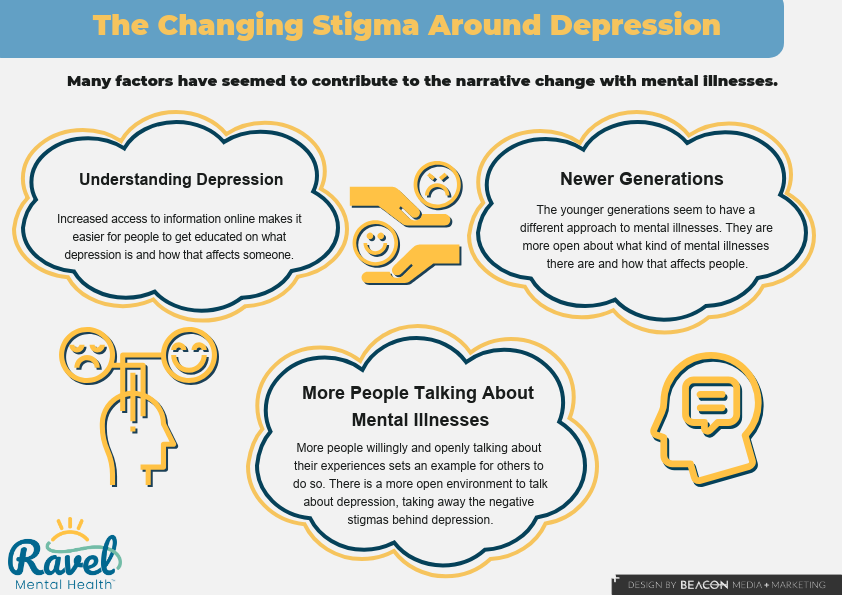People have struggled to openly talk about mental illnesses or disorders for a long time. They can be scary to talk about since issues with mental health can feel very personal, and others may not fully understand it either. The lack of education behind mental illnesses can lead some people to be mean or judge others for having a condition or displaying symptoms of their mental illness.
However, with the internet becoming an endless library of information, learning more about mental illnesses such as depression, anxiety, PTSD, and more has become easier. It’s also opened a new platform for talking about these problems and how that affect people’s daily lives.
With the mix of available information and an online community, more conversations are happening about mental illnesses. So, is the stigma surrounding depression improving? Here you can learn more about depression and what has caused a shift in the depression stigma.
Are you interested in finding help for depression? Sign up for Ravel Mental Health to connect with a therapist.
What Is Depression?
Depression is a mood disorder that can make you have feelings of persistent sadness and loss of interest. It can affect how you feel, think, and behave daily. The World Health Organization estimates that 5.0% of adults suffer from depression and that this condition is the leading cause of disability worldwide.
Sometimes depression can lead to emotional and physical problems. People who have depression can also experience other mental health issues, such as anxiety. Depression can sometimes make life feel dull and purposeless, as if you’re going through the motions of your routine.
Physical problems are a normal side effect of depression because it can lead to someone lacking self-care. This can present itself through someone no longer exercising or eating healthy. However, this can go down to the small details of someone showering, brushing their teeth, or changing their clothes.
Depression is more than just feeling blue, and it isn’t a weakness that you can “snap out” of. It is caused by the chemical levels in your brain either being too low or too high. Most people with depression can feel better with medications, psychotherapy, or both.
What Are The Signs of Depression?
Depression can show itself in many different ways. For some people, it can be a daily, crippling disorder that hinders their ability to do most things. At the same time, other people may still be able to function through their routine but still experience some of the side effects through episodes.
Symptoms can occur most of the day, nearly every day, and may include:
- Feelings of sadness, tearfulness, emptiness, or hopelessness
- Angry outbursts, irritability, or frustration for even the smallest of things
- Loss of interest or pleasure in your normal activities such as sex, hobbies, or sports
- Sleep disturbances such as insomnia or sleeping too much
- Tiredness and lack of energy, even for small tasks
- Reduced appetite and weight loss or increased cravings and weight gain
- Anxiety, agitation, or restlessness
- Slowed thinking, speaking, or body movements
- Feelings of worthlessness or guilt that’s fixated on past failures or self-blame
- Trouble thinking, concentrating, making decisions, and remembering things
- Frequent or recurring thoughts of death, suicidal thoughts, suicide attempts, or suicide
- Unexplained physical problems such as back pain or headaches
For many people with depression, the symptoms are noticeable in day-to-day activities, such as work, school, social activities, or relationships with others. Some people may feel generally miserable or unhappy without knowing why.
Why Is There Stigma Surrounding Depression?
The way society has viewed mental illnesses has changed over time. But why was there a stigma against depression in the first place?
Many people didn’t understand why they felt depressed. Some people have relatively good lives and may feel unsure why they’re still sad. The approach was to just “shake it off.”
However, as time has gone on and understanding the human brain has expanded, it’s been widely accepted that genetics and disruptions in the brain are some of the main causes of depression. Outside factors such as a bad upbringing can still affect someone’s mood, but there is an understanding that how our brain chemically functions is a significant factor in mental illnesses.
A big stigma surrounding depression is that people can’t have a good life and still be depressed. Many assume that depression can only be for people living through challenging life situations. If you are feeling depressed, it’s important to remember that you can still be beautiful, successful, young, and have everything going well but still face symptoms of depression.
Are you feeling symptoms of depression? Sign up for Ravel Mental Health today so you can connect with a therapist in your area.

Is The Stigma Around Depression Changing?
Many factors have seemed to contribute to the narrative change with mental illnesses. One main reason is the change of understanding of how depression is caused.
Understanding Depression
A study published in JAMA Network Open examined how stigma has changed over time starting in 1996. It found that people from 1996 to 2006 increasingly believed that mental problems are associated with genetics and disruptions in the brain. However, in 2018, the study showed that people had a lower willingness to interact with people that have major depression.
The study attributes this shift to people holding more stigmatized attitudes or conservative values as they age. It’s suggested that the younger generations hold less stigmatized attitudes and beliefs that can be attributed to the different experiences the groups have early in life and work.
Increased access to information online makes it easier for people to get educated on what depression is and how that affects someone.
Newer Generations
The younger generations seem to have a different approach to mental illnesses. They are more open about talking about mental illness and bringing awareness to how common they are. Many understand that mental illnesses are caused by a variety of factors, including neurological and biological causes.
The newer generations also have grown up with the digital age. They’re used to having online communities that can discuss a number of topics. Some may feel more comfortable talking about their depression on an online forum.
People can feel less intimidated to talk about their depression online rather than confronting someone they know. This can be a great first step for learning more about depression and taking the first step to reach out.
If they can talk about it online and understand how their depression affects them, then it can become easier to talk about it in person.
More People Talking About Mental Illnesses
Another contribution to the stigma behind depression is how many people have openly talked about their struggles with depression. Several influential and famous people have come out to talk about how depression has affected their lives.
More people willingly and openly talking about their experiences sets an example for others to do so. There is a more open environment to talk about depression, taking away the negative stigmas behind depression.
Do You Have Depression?
Depression is a mental illness that should be professionally diagnosed. There are several resources online that can help guide you in determining if you have depression.
Resources can include lists of symptoms you may be experiencing, while others may offer a quiz to see if you may be depressed. It’s important to talk to your doctor or seek a therapist to get help.
If you are unsure where you can find a therapist in your area, you can use Ravel Mental Health. It’s an online platform that allows you to connect with therapists in your area that specialize in whatever you need.
Through Ravel Mental Health, you can schedule your appointments in a few easy clicks that let you avoid having to call and rework your schedule. We want to help connect you to the therapist that will help you in your journey of depression.
Want to see what therapists are in your area? Sign up for Ravel Mental Health today!
